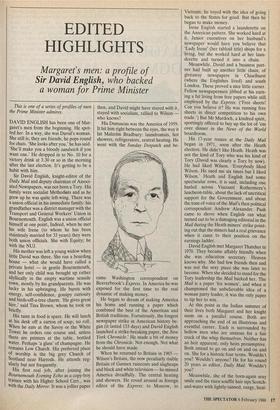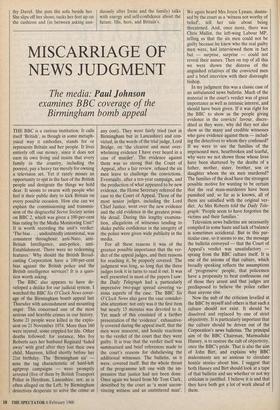EDITED HIGHLIGHTS
Margaret's men: a profile of
Sir David English, who backed
a woman for Prime Minister
This is one of a series of profiles of men the Prime Minister admires.
DAVID ENGLISH has been one of Mar- garet's men from the beginning. He spot- ted her. In a way, she was David's woman. She still is; they are friends; he pops round for chats. 'She looks after you,' he has said. `She'll make you a bloody sandwich if you want one.' He dropped in to No. 10 for a victory drink at 3.30 or so in the morning after the last election. It's getting to be a habit with him.
Sir David English, knight-editor of the Daily Mail and deputy chairman of Associ- ated Newspapers, was not born a Tory. His family were socialist Methodists and as he grew up he was quite left-wing. There was a union official in his immediate family: his grandfather was a district manager with the Transport and General Workers' Union in Bournemouth. English was a union official himself at one point, Indeed, when he met his wife Irene (to whom he has been stainlessly married for 33 years) they were both union officials. She with Equity; he with the NUJ.
His mother was left a young widow when little David was three. She ran a boarding house — what she would have called a private hotel — in gentle Bournemouth, and her only child was brought up rather idyllically in the empty wartime seaside town, mostly by his grandparents. He was lucky in his upbringing. He bursts with energy, self-confidence, gossipy curiosity and birds-off-a-tree charm. 'He gives great hire,' said Tina Brown, whom he took on briefly. His taste in food is spare. He will lunch at his desk off a carton of soup; no roll.
When he eats at the Savoy or the White Tower he orders one course and, unless there are printers at the table, bottled water. Perhaps 'a glass' of champagne. He remains Low Church. His preferred place of worship is the big grey Church of Scotland near Harrods. He attends reg- ularly but not frequently. His first real job, after joining the Bournemouth Evening Echo as a copy-boy trainee with his Higher School Cert., was with the Daily Mirror. It was a jollier paper then, and David might have stayed with it, stayed with socialism, rallied to Wilson who knows?
His Damascus was the America of 1959. It hit him right between the eyes, the way it hit Malcolm Bradbury: laundromats, hot showers, refrigerators, central heating. He went with the Sunday Despatch and be- came Washington correspondent on Beaverbrook's Express. In America he was exposed for the first time to the real dynamic of making money.
He began to dream of making America his home and running a paper which combined the best of the American and British traditions. Fortuitously, the longest newspaper strike in American history be- gan (it lasted 133 days) and David English launched a strike-breaking paper, the New York Chronicle.' He made a bit of money from the Chronicle. Not enough. Not what he should have made.
When he returned to Britain in 1965 Wilson's Britain, the now peculiarly risible Britain of Gannex raincoats and slagheaps and black and white television — he missed America dreadfully. The central heating and showers. He roved around as foreign editor of the Express: to Moscow, to Vietnam; he toyed with the idea of going back to the States for good. But then he began to make money.
Irene English started a launderette on the American pattern. She worked hard at it. Junior executives on her husband's newspaper would have you believe that `Lady Irene' (her tabloid title) shops for a living, but she worked hard at her laun- derette and turned it into a chain.
Meanwhile, David and a business part- ner had built up another little chain; of giveaway newspapers in Chiselhurst (where the Englishes lived) and south London. These proved a nice little earner. Fellow newspapermen jibbed at his earn- ing a fat living from free papers while still employed by the Express. (Tree sheets! Can you believe it? He was running free sheets in direct competition to his own trade.') But Mr Murdoch, a kindred spirit, sportingly offered to buy up the lot of 'em over dinner in the News of the World boardroom.
His 17-year tenure at the Daily Mail began in 1971, soon after the Heath election. He didn't like Heath. Heath was not the kind of Tory who was his kind of Tory (David was clearly a Tory by now). He had liked Wilson. 'Everybody liked Wilson. He sued me six times but I liked Wilson.' Heath and English had some spectacular rows, it is said, including one hurled across Viscount Rothermere's luncheon-table, about the lack of uncritical support for the Government, and about the tone of voice of the Mail's then political correspondent Andrew Alexander. Push came to shove when English ran what turned out to be a damaging editorial in the Mail during the Heath miners' strike point- ing out that the miners had a real grievance when it came to their position on the earnings ladder.
David English met Margaret Thatcher in 1970. They became affably friendly when she was education secretary. Heaven knows why. She had few friends then and was not the sexy piece she was later to become. When she decided to stand for the Tory leadership the Mail backed her. The Mail is a paper 'for women', and when it championed the unbelievable idea of a woman party leader, it was the only paper to tip her to win.
At this point in the Indian summer of their lives both Margaret and her knight seem on a parallel course. Both are approaching the end of an illustrious and eventful career. Each is surrounded by hollow men who are anxious for a fair crack of the whip themselves. Neither has an heir apparent; only heirs presumptive. Both intend to go on and on and on and on. She for a historic four terms. Wouldn't you? Wouldn't anyone? He for his round 20 years as editor, Daily Mail. Wouldn't you?
Meanwhile, she of the born-again sexy smile and the risen soufflé hair sips Scotch- and-water with lightly-tanned, rangy, heal- thy David. She pats the sofa beside her. She slips off her shoes; tucks her feet up on the cushions and (in between asking assi- duously after Irene and the family) talks with energy and self-confidence about the future. His, hers, and Britain's.



















































 Previous page
Previous page